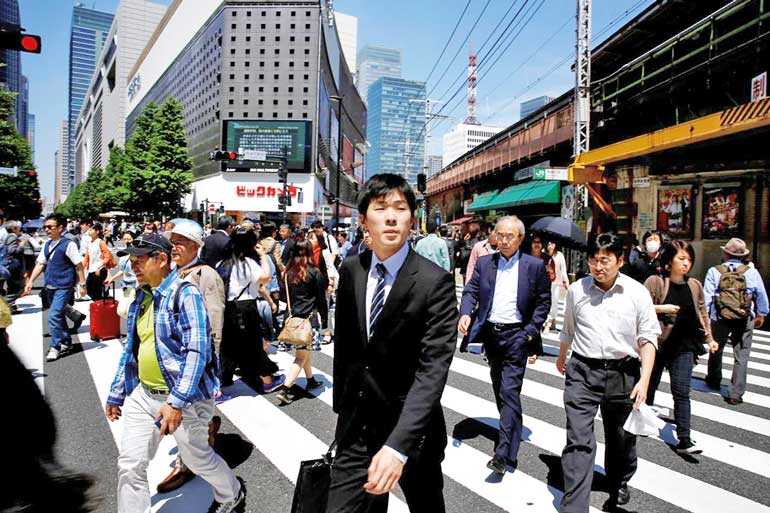Tuesday Feb 24, 2026
Tuesday Feb 24, 2026
Monday, 18 November 2019 00:00 - - {{hitsCtrl.values.hits}}

TOKYO (Reuters): Japan’s economy ground to a near standstill in the third quarter with growth at its weakest in a year as the US-China trade war and soft global demand knocked exports, keeping pressure on policymakers to ramp up stimulus to bolster a fragile recovery.
Private consumption also cooled from the previous quarter, casting doubt on the Bank of Japan’s view that robust domestic demand will offset the impact from intensifying global risks.
The world’s third-largest economy grew an annualised 0.2% in the third quarter, slowing sharply from a revised 1.8% expansion in April-June, preliminary gross domestic product (GDP) data released by the Government showed on Thursday.
It fell well short of a median market forecast for a 0.8% gain and marked the weakest growth since a 2.0% contraction in July-September last year.
“Domestic demand had made up for some of the weakness in external demand, but we can’t count on this to continue,” said NLI Research Institute executive research fellow Taro Saito.
“A contraction in October-December GDP is a done deal. The economy may rebound early next year, but will lack momentum.”
The feeble data may heighten calls from lawmakers for the Government to boost fiscal spending to support the economy, which many fear will take a hit from a sales tax hike that took effect in October.
Private consumption grew 0.4% in July-September, slowing from a 0.6% increase in the previous quarter, despite stronger demand from households which sought to beat the October tax hike.
Capital spending, a rare bright spot in the economy, rose 0.9% in the third quarter, accelerating from the previous three months. That helped domestic demand add 0.2 percentage point to growth.
But external demand knocked 0.2 percentage point off GDP growth, as exports were hit by the protracted China-US trade war that has upended world supply chains and hurt the global economy.
Markets have been on edge in the past month as the United States and China seek to complete an initial trade deal to de-escalate their bitter tariff row. US President Donald Trump on Tuesday dangled the prospect of completing the initial deal with China “soon” but has so far offered no new details on the negotiations.
The dispute has already hit big exporters hard. Japanese electronics giant Panasonic Corp (6752.T) last month reported a 12% drop in its second-quarter operating profit due to slumping sales of electric components to factory owners.
Moreover, worsening ties with South Korea had “a big impact” on already weak exports, Economy Minister Yasutoshi Nishimura told reporters after the GDP data release.
“Exports will remain weak due to slack demand for cars and electronics parts. In addition, declines in tourists from South Korea are having large negative effects,” he said.
Relations between South Korea and Japan began to deteriorate late last year following a diplomatic row over compensation for wartime forced labourers during Japan’s occupation of Korea. The dispute has spilled into trade as Tokyo put restrictions on exports of semiconductor materials to South Korea, Japan’s No.3 trading partner.
Spending by inbound tourists, which are counted as part of exports in GDP data, was crunched by sharp declines in the number of Korean tourists in August and September. Japanese exports to the country tumbled 16% in September, dragged down by shipments of cars, TVs, computers and semiconductor production equipment.
While Japan’s economy is likely to continue recovering moderately, the Government will be vigilant to the impact from global risks and the sales tax hike, Nishimura said.
“The fundamentals underpinning consumption remains firm. But consumer sentiment is weak, so we need to keep an eye out on developments,” he added.
The data comes as the Government plans to compile a package of measures for disaster relief and to protect the economy from heightening global risks.
The BOJ kept monetary policy steady last month but signalled its readiness to maintain or even cut already low interest rates to underpin a fragile recovery.